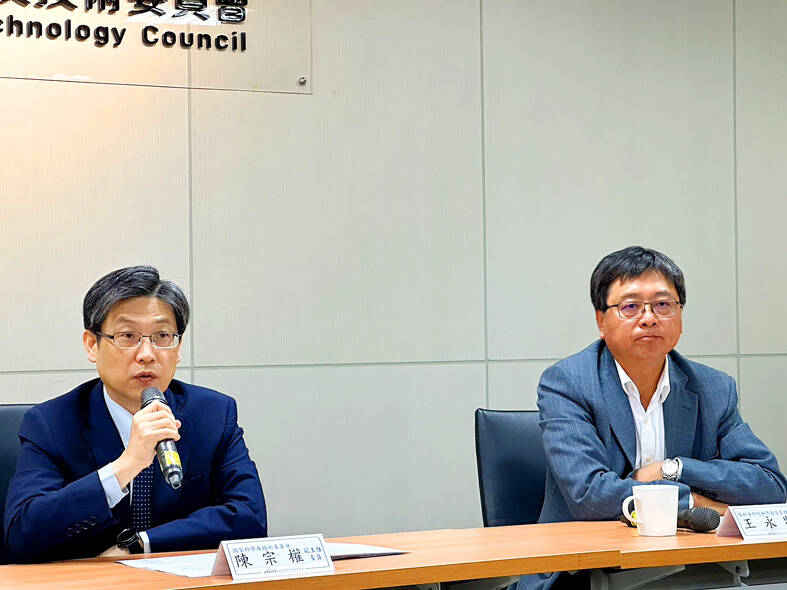Firms in the Hsinchu Science Park (新竹科學園區), which houses major tech companies, reported laying off 496 employees last month amid weakened global demand, Hsinchu Science Park Bureau director-general Wayne Wang (王永壯) said yesterday.
Wang told a news conference that 48 companies in the science park laid off employees last month, including one hard disk supplier which let go 241 employees as part of a plant closure due to falling demand.
Other companies reported sporadic layoffs as they adjusted to weakening demand, he said.

Photo: Yang Yuan-ting, Taipei Times
Wang made the remarks after local media reported the layoffs over the weekend.
Although the global economy is struggling with high inflation and interest rate hikes, recession remains unlikely, he said, adding that many companies in the Hsinchu Science Park are requesting to expand.
Construction of the first software building in the park’s 36-hectare “X” base — which is to be a hub for the development of emerging technologies such as precision healthcare and generative artificial intelligence — is scheduled to be completed in May, and is expected to spark a hiring drive.
National Science and Technology Council (NSTC) Deputy Minister Chen Tzong-chyuan (陳宗權) told the news conference that despite layoffs, the number of employees at the park at the end of last month rose 2 percent from a year earlier to 176,504.
In the first 10 months of this year, 1,605 workers in the park were laid off, less than 1 percent of the total number of employees, Chen added.
The NSTC oversees Taiwan’s three major science parks: Hsinchu Science Park, Central Taiwan Science Park (中部科學園區) and Southern Taiwan Science Park (南部科學園區).
So far this year, 52 foreign and local companies have set up operations in the three science parks, with their presence expected to attract NT$352.9 billion (US$11.2 billion) in private investment, Chen said.
The total number of people employed in all three science parks last month was 323,976, up from 323,113 a year earlier, he said.
The NSTC has instructed Hsinchu Science Park authorities to provide necessary assistance to the laid-off workers and urge firms to use furlough programs where possible to cushion employees from the effects of falling global demand, he said.

With an approval rating of just two percent, Peruvian President Dina Boluarte might be the world’s most unpopular leader, according to pollsters. Protests greeted her rise to power 29 months ago, and have marked her entire term — joined by assorted scandals, investigations, controversies and a surge in gang violence. The 63-year-old is the target of a dozen probes, including for her alleged failure to declare gifts of luxury jewels and watches, a scandal inevitably dubbed “Rolexgate.” She is also under the microscope for a two-week undeclared absence for nose surgery — which she insists was medical, not cosmetic — and is

CAUTIOUS RECOVERY: While the manufacturing sector returned to growth amid the US-China trade truce, firms remain wary as uncertainty clouds the outlook, the CIER said The local manufacturing sector returned to expansion last month, as the official purchasing managers’ index (PMI) rose 2.1 points to 51.0, driven by a temporary easing in US-China trade tensions, the Chung-Hua Institution for Economic Research (CIER, 中華經濟研究院) said yesterday. The PMI gauges the health of the manufacturing industry, with readings above 50 indicating expansion and those below 50 signaling contraction. “Firms are not as pessimistic as they were in April, but they remain far from optimistic,” CIER president Lien Hsien-ming (連賢明) said at a news conference. The full impact of US tariff decisions is unlikely to become clear until later this month

GROWING CONCERN: Some senior Trump administration officials opposed the UAE expansion over fears that another TSMC project could jeopardize its US investment Taiwan Semiconductor Manufacturing Co (TSMC, 台積電) is evaluating building an advanced production facility in the United Arab Emirates (UAE) and has discussed the possibility with officials in US President Donald Trump’s administration, people familiar with the matter said, in a potentially major bet on the Middle East that would only come to fruition with Washington’s approval. The company has had multiple meetings in the past few months with US Special Envoy to the Middle East Steve Witkoff and officials from MGX, an influential investment vehicle overseen by the UAE president’s brother, the people said. The conversations are a continuation of talks that

CHIP DUTIES: TSMC said it voiced its concerns to Washington about tariffs, telling the US commerce department that it wants ‘fair treatment’ to protect its competitiveness Taiwan Semiconductor Manufacturing Co (TSMC, 台積電) yesterday reiterated robust business prospects for this year as strong artificial intelligence (AI) chip demand from Nvidia Corp and other customers would absorb the impacts of US tariffs. “The impact of tariffs would be indirect, as the custom tax is the importers’ responsibility, not the exporters,” TSMC chairman and chief executive officer C.C. Wei (魏哲家) said at the chipmaker’s annual shareholders’ meeting in Hsinchu City. TSMC’s business could be affected if people become reluctant to buy electronics due to inflated prices, Wei said. In addition, the chipmaker has voiced its concern to the US Department of Commerce